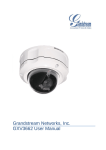Download Grandstream Networks GXV3601_HD surveillance camera
Transcript
Grandstream Networks, Inc. GXV3601 User Manual GXV3601 IP Camera Safety Instructions These instructions are intended to assist users with the operation of the GXV3601 and also to instruct on how to avoid dangerous situations or damage to the device. Warnings: Serious injury or death may be caused if any of the warnings below are neglected. Cautions: Injury or damage to the equipment may occur if any of the following caution messages are neglected. Warnings Follow these safeguards to prevent serious injury or death. Cautions Follow these precautions to prevent potential injury or material damage. Warnings: Input voltage should meet both the SELV (Safety Extra Low Voltage) and the Limited Power Source with DC 12V according to the IEC60950-1 standard. Please refer to the technical specifications for more details. Do not use a third-party power adapter or power cord When the device is installed on the wall or ceiling, make sure that it is firmly attached. Notice: Make sure that the power supply voltage is correct before using the camera. Do not drop the device or expose it to physical shock. Do not expose the device to temperatures outside the range of -10 oC to +60oC when the device is in operation. Do not expose the device to damp/wet conditions or high electromagnetism radiation. To avoid heat accumulation, make sure that your operating environment has proper ventilation. Do not attempt to open, disassemble, or modify the device A few parts (e.g. electrolytic capacitor) of the equipment shall be replaced regularly according to their average life time. The average life time varies from the differences between operating environments and usage history. Regular maintenance checks are recommended for all users. Please contact your dealer for more details. Firmware 1.0.4.6 Grandstream Networks, Inc. 09/2010 Page 2 of 36 GXV3601 IP Camera Contents Welcome .........................................................................................................................................................4 Package Contents ............................................................................................................................................5 Product Overview ...........................................................................................................................................6 GXV3601 Overview ...............................................................................................................................6 GXV3601 Side View- (This is only applicable on GXV3601-N)...........................................................6 GXV3601 Back Panel .............................................................................................................................7 GXV3601 Sample Connection Diagram.................................................................................................8 GXV3601 Key Features..........................................................................................................................8 GXV3601 Lens Specification ...............................................................................................................10 GXV3601 Recommended Lens Specification ...................................................................................... 11 Minimum Recommended System Requirement ...................................................................................12 Connect your GXV3601 .......................................................................................................................12 Configuring the GXV3601 via Web Browser ...............................................................................................13 Access GXV3601 Web Configuration Menu ........................................................................................13 Connect the Camera to DHCP server. ...................................................................................................13 Connect to the Camera using Static IP. .................................................................................................14 GXV3601 Home Web Page ..................................................................................................................15 GXV3601 System Page ........................................................................................................................16 GXV3601 Video & Audio Page ............................................................................................................17 GXV3601 Networking Page – Assign an IP to GXV3601 ...................................................................19 GXV3601 Wifi Page – GXV3601 supports WIFI via wireless dongles. ..............................................20 GXV3601 DDNS Page .........................................................................................................................20 GXV3601 SIP Page ..............................................................................................................................21 GXV3601 Status Page ..........................................................................................................................23 GXV3601 User Management Page .......................................................................................................24 GXV3601 Maintenance Page ...............................................................................................................24 GXV3601 SMTP Page ..........................................................................................................................25 GXV3601 FTP Page .............................................................................................................................26 GXV3601 PTZ Page .............................................................................................................................26 GXV3601 Alarm Event.........................................................................................................................27 GXV3601 Motion Detection.................................................................................................................30 GXV3601 System Log..........................................................................................................................32 FAQ...............................................................................................................................................................33 Firmware 1.0.4.6 Grandstream Networks, Inc. 09/2010 Page 3 of 36 GXV3601 IP Camera Welcome The GXV3601 is a next generation IP camera for remote monitoring and surveillance over your LAN or internet. The GXV3601 combines best in class IP video technology and SIP protocols for a robust IP surveillance solution. The product features H.264 video streams with up to 30 frames per second in full D1, delivering rich image clarity at rapid transmission rates. Integrated SIP can pass alarms to the PSTN, mobile phones, SIP IP phones, SIP videophones and enables 2-way VoIP communication. The GXV3601 ensures ease of use, integration and deployment with a multilingual graphical user interface. The GXV3601 can be quickly installed and connected to your network and accessed from anywhere over the internet. Grandstream’s flexible video management software enables users to monitor multiple environments in one easy to use application. The intuitive web interface lets users easily access, manage, view and record live video streams from the device. The GXV3601 is a powerful solution for small to medium sized offices, homes and storage facilities looking to safeguard their valuables. Firmware 1.0.4.6 Grandstream Networks, Inc. 09/2010 Page 4 of 36 GXV3601 IP Camera Package Contents Items in the package: • • • • GXV3601 IP Camera 12V DC power Adapter 6-pin terminal block connector – 6-pin connector block for connecting external devices, such as infrared detector, smoke detector and etc., to Alarm IN, Alarm OUT and RS485 pins. Quick installation guide Firmware 1.0.4.6 Grandstream Networks, Inc. 09/2010 Page 5 of 36 GXV3601 IP Camera Product Overview GXV3601 Overview TABLE 1: GXV3601 PRODUCT MODELS Model GXV3601-N GXV3601-HD GXV3601-LL P/N xxx-xx004-xxx xxx-xx009-xxx xxx-xx0011-xxx GXV3601 Side View- (This is only applicable on GXV3601-N) Firmware 1.0.4.6 Grandstream Networks, Inc. 09/2010 Page 6 of 36 GXV3601 IP Camera GXV3601_LL and GXV3601_HD have no DC driver IRIS GXV3601 Back Panel Indicators and Connectors on Back Panel NETWORK – 10/100 Switch LAN port for connecting to Ethernet. The indicator will be steady for connection and flashing for network activity. AUDIO IN – 3.5mm port for audio input devices (microphone, pickup and etc.). AUDIO OUT – 3.5mm port for audio output devices (speakers, and etc.). VOUT – 1 BNC (Voltage: 1.0V p-p, Resistance 75Ω) port for video output. This is only applicable on GXV3601-N/GXV3601-LL. DC 12V – 12V DC power jack; UL Certified. SD/MMC – SD card slot. RESET – Press the Reset button for 6 seconds to perform a factory reset. PINs – 1 PTZ connector, Alarm In connector, and Alarm out connector. USB – USB connector for USB flash/hard drives. Firmware 1.0.4.6 Grandstream Networks, Inc. 09/2010 Page 7 of 36 GXV3601 IP Camera POWER – The indicator will be solid green if the power is on. GXV3601 Sample Connection Diagram GXV3601 Key Features The table below lists the key features the GXV3601 Supports. Features GXV3601-N GXV3601-HD GXV3601-LL Image Sensor 1/3” Sony Supper HAD CCD 1/3.2”, 2-Megapixel CMOS, 1,600H x 1,200V 1/4”, CMOS, 680H x 512V digital and NTSC/PAL analog outputs Lens Type 1/3” Varifocal 3.5-8mm, CS mount, changeable 1/3”, 3.5-8mm, F1.4, Mega Manual-Iris, CS 1/3”, 3.5-8mm, F1.4, Manual-Iris, CS Minimum Illumination 0.015 at F1.4 0.5Lux at F1.2 0.05Lux at F1.2 H.264, JPEG, Motion JPEG Video Compression Max Video Resolution Full D1: 704 x 576(PAL) 704 x 480 (NTSC) Firmware 1.0.4.6 Grandstream Networks, Inc. 09/2010 1,600 x 1,200 640x480 (VGA), 320x240 (QVGA), 720x480 (NTSC D1), 352x240 (NTSC CIF), 176x112 (NTSC QCIF); Page 8 of 36 GXV3601 IP Camera 720x576 (PAL D1), 352x288 (PAL CIF), 172x144 (PAL QCIF) Max Frame Rate in Max 30fps/25fps at D1 resolution (NTSC/PAL) 20fps for 1,600x900, 30fps for 1,280 x 720, 30fps for 800x450, 640x360, 480x270, 320x180 and 240x135 30fps for VGA & NTSC, 25fps for PAL Video Bit Rate 32 Kbps – 2 Mbps 32 Kbps – 4 Mbps, adjustable (8 Mbps maximum) 32 Kbps – 2 Mbps Video Output 1BNC ( voltage1.0Vp-p, resistance75) N/A 1BNC ( voltage1.0Vp-p, Audio Input Audio Output 3.5mm LINE IN 3.5mm LINE OUT Audio Compression G.711, G726 Alarm Input Alarm Output IRIS Control resistance75) Yes -1, Normal Open Yes -1 Manual Iris DC Iris Manual Iris Serial Ports RS485 Embedded Analytics Motion Detection (up to 16 target areas), video loss (pending) Pre-/post alarm buffer Snapshots Network Protocol Network Port 24MB Triggers upon alarm events, send via email/FTP TCP/UDP/IP, RTP/RTCP, RTSP, DHCP, PPPoE(Pending), DDNS, HTTP, HTTPS,SMTP,FTP,SIP 10M/100M auto-sensing, RJ45 Multi-streamingrate for Preview and Recording Yes Security Power over Ethernet (PoE) Standard, IEEE 802.3af Class 3 Peripheral Ports SD 2.0, USB Host 2.0 HTTPS, password SIP/VoIP Support Weight Temperature / Humidity Power Yes 0.6kg 0.6kg 0.6kg 0°C – 45°C(32°F–133°F) 0°C – 45°C (32°F–133°F) 0°C – 45°C(32°F–133°F) Humidity 10–90% RH Humidity 10–90% RH (non–condensing) (non–condensing) Humidity 10–90% RH (non–condensing) Output: 12VDC/1.5A; Input: 100–240VAC, 50–60Hz Firmware 1.0.4.6 Grandstream Networks, Inc. 09/2010 Page 9 of 36 GXV3601 IP Camera Compliance FCC Part15, Subpart B Class B; EN 55022 Class B, EN61000-3-2, EN61000-3-3, EN 55024, EN60950-1; C-tick AS/NZS CISPR 22, CISPR 24 GXV3601 Lens Specification Parameters GXV3601-N GXV3601-LL GXV3601-HD Lens Mount Lens Format CS 1/3” CS 1/3” CS 1/3” Mega Focal Length Variable focus, 3.5 to 8.0 mm Variable focus, 3.5 to 8.0 mm Variable focus, 3.5 to 8.0 mm 8.28~13.38mm 8.28~13.38mm 1/1.4 1.4~360 1.4~360 Horizontal View Angle IRIS 81 o DC Iris 16.4mm (Front) / 9mm (Rear) 100 o ~43 o / 78 o ~34 o / 57 o ~25.5 o Manual Iris 16.4mm (Front) / 9mm (Rear) 100 o ~43 o / 78 o ~34 o / 57 o ~25.5 o Manual Iris Minimum Object Distance 0.20 m (0.65 ft) 0.1 m 0.1 m Size (Diameter x Length 1 x Length 2) 36 x 52 x 52 mm (1.42 x 2.05 x 2.05 in) φ33 X (43.7)mm φ33 X (43.7)mm Weight Operation 95 g (3.35 oz) Focus (w/lock) 101g Focus 101g Focus Zoom (w/lock) Zoom (w/lock) Back Focal Length Aperture (D/f’) Effective Aperture (w/lock) (w/lock) Zoom (w/lock) Figure1: Lens Specifications for GXV3601-HD and GXV3601-LL Firmware 1.0.4.6 Grandstream Networks, Inc. 09/2010 Page 10 of 36 GXV3601 IP Camera GXV3601 Recommended Lens Specification Parameters Lens Mount CS Recommendation CS mount is commonly used C C/CS adapter ring is needed for C mount Lens Format 1/3” Focal Length Fixed Focus Variable Focus f = 4 mm, f = 6 mm, or f = 8 mm f = 3 to 8 mm; f = 5 to 55 mm Aperture (D/f’) Constant Aperture F = 1.2, F = 1.6 Variable Aperture F1.2 ~ C DC Automatic Aperture GXV3601 has DC-IRIS driver circuit and DC Automatic Aperture lens can be used Angle of View Normal Angle 40 o Infrared Filter Wide angle > 90 o According to the actual need, IR lens or Lens with IR-light-compatible might be needed Firmware 1.0.4.6 Grandstream Networks, Inc. 09/2010 to 90 o Page 11 of 36 GXV3601 IP Camera Installation Guide Minimum Recommended System Requirement • • • • Windows 2000 Server Professional, Windows XP, Windows Vista. CPU: Intel Pentium 4 or higher, 2 GHz. RAM: 1 GB (4 GB recommended for larger systems). Support for DirectX 8.0 and above. . Connect your GXV3601 Using the Power adapter as power supply • • • • Connect an RJ-45 cable to the NETWORK port of the GXV3601. Connect the other end of the RJ-45 cable to your network or PC. Connect the power supply to the DC 12V power jack on the back of the GXV3601. Connect the other end of the power supply to a wall outlet. The POWER LED will turn solid green. Using PoE as power supply: • • Connect an RJ-45 to the NETWORK port of GXV3601. Connect the other end of the RJ-45 cable to a PoE switch. The POWER indicator will turn solid green. NOTE: If you are going to connect the device to a hub/switch/router, please use a straight-through cable. A cross over cable should be used if you are going to connect the device directly to a PC. Firmware 1.0.4.6 Grandstream Networks, Inc. 09/2010 Page 12 of 36 GXV3601 IP Camera Configuring the GXV3601 via Web Browser The GXV3601’s embedded Web server responds to HTTP/HTTPS GET/POST requests. Embedded HTML pages allow you to configure your IP camera through Microsoft Internet Explorer. Access GXV3601 Web Configuration Menu Connect the Camera to DHCP server. 1. Navigate your browser to: http://www.grandstream.com/support/gxv_series_surveillance/general/resources/gs_ search.zip 2. Run the Grandstream GS_Search tool, that you just downloaded. 3. Click on button in order to begin device detection 4. The detected devices will appear in the Output field 5. Start Internet Explorer on your computer. 6. Enter device IP in the address bar of the browser. 7. Enter the administrator user name and password to access the Web Configuration Interface 8. The default user name and password are both set to admin. 9. IE will indicate that “This website wants to install the following add-on: ‘GSViewerX.cab’ from ‘Grandstream Networks Inc’.” Install this add-on by following the instructions in IE. 10. You will see the home page. Firmware 1.0.4.6 Grandstream Networks, Inc. 09/2010 Page 13 of 36 GXV3601 IP Camera Connect to the Camera using Static IP. If the camera does not get response from DHCP server after 3 minutes, it can be accessed by the default IP 192.168.1.168. 1. Connect your PC to the same network as the GXV3601. 2. Configure the IP address of your PC to: 192.168.1.XXX (1<XXX<255) and configure the subnet mask to 255.255.255.0. 3. Make sure that the device is turned on and connected to the network. 4. Start Internet Explorer on your computer. 5. Enter 192.168.1.168 in the address bar of the browser. 6. Enter the administrator user name and password to access the Web Configuration Interface 7. The default user name and password are both set to admin. 8. IE will indicate that “This website wants to install the following add-on: ‘GSViewerX.cab’ from ‘Grandstream Networks Inc’.” Install this add-on by following the instructions in IE. 9. You will see the home page. Firmware 1.0.4.6 Grandstream Networks, Inc. 09/2010 Page 14 of 36 GXV3601 IP Camera GXV3601 Home Web Page Figure2: Home web page of GXV3601-N and GXV3601-LL Figure3: Home web page of GXV3601-HD Firmware 1.0.4.6 Grandstream Networks, Inc. 09/2010 Page 15 of 36 GXV3601 IP Camera Items on GXV3601 Home Page 1 Motion Detection 2 Alarm Event 3 4 5 6 Control Console ZOOM FOCUS Default 7 8 9 10 11 SPEED BRIGHTNESS CONTRAST SATURATION View Size 12 13 Play Capture 14 Record 15 16 17 18 Sound Off/On Talk Playback Config If the motion detection alarm is triggered, the indicator will flash red. Click on the indicator to turn off the alarm. If an alarm event is triggered, the indicator will flash red. Click on the indicator to turn off the alarm. PTZ Console controller. PTZ device needs to be connected. NOTE: GXV3601 does not support zoom Adjusts the focus of images. Click this option to reset the video brightness, contrast, and saturation to their factory default configuration. Adjusts the rotation speed of the console. Adjusts the image brightness. Adjusts the image contrast. Adjusts the image saturation. Resize the image to fit into the window panel in the home scream. Plays/Stops the video. Captures the image displayed and saves it to C:\GS_Capture (default directory). Records the video and saves it to C:\GS_Record (default directory). Toggles the sound On or Off. Establishes two-way audio. Replays the saved video. Configures the Save Location for captured images and recorded videos. GXV3601 System Page This page allows you to configure the system settings on GXV3601. Current System Time - displays the current date and time (24h clock). Set the System Time Update via NTP Server - the camera will obtain the time from an NTP server Specify the NTP server's IP address or Firmware 1.0.4.6 Grandstream Networks, Inc. 09/2010 Page 16 of 36 GXV3601 IP Camera host name. And you can select your time zone from the drop-down list or define your own time zone setting. NOTE: If using a host name for the NTP server, a DNS server must be configured under Basic Settings -> Networking. Synchronize with Local Computer - sets the time from the clock on your computer. Set the Time Manually - this option allows you to manually set the time and date. OSD Date Format - set the format of date on OSD Device Name Setting -This field lets you configure the name of the GXV3601, which helps GSurf and GS_NVR to indentify the device when using GS_Search to search all the Grandstream network cameras or digit video cameras in the same subnet. DI and DO - Digital input and digital output Normal open: the circuit is by default open unless an event triggers the device to close the circuit. Normal close: the circuit is by default closed unless and event triggers the device to open the circuit GXV3601 Video & Audio Page On Screen Display (OSD) Settings OSD Time/ Text – The time stamp and channel name displayed on the screen. Video Settings Preferred Video Codec – The GXV3601 supports the H.264 video codec. Firmware 1.0.4.6 Grandstream Networks, Inc. 09/2010 Page 17 of 36 GXV3601 IP Camera Resolution – The higher the resolution is, the better the video quality is, and higher bandwidth is required. Low -----------------------Æ High Resolution QCIF CIF 2CIF D1 Bit Rate – The number of bits that are conveyed or processed per unit of time. Maximum Frame Rate – The video frame rate is adjustable based on network conditions. Increasing the frame rate will increase the amount of data significantly therefore consuming more bandwidth. Video will be impaired due to packet loss when there is insufficient bandwidth. Bit Rate Control – Variable Bit rate (VBR) and Constant Bit Rate (CBR). Variable Bit Rate - If VBR is selected, the codec varies the amount of output data per time segment. VBR produces a better quality-to-space ratio. The bits available are used to enable more flexibly and encode sound or video data more accurately, with fewer bits used in less demanding passages and more bits used in difficult-to-encode passages. Constant Bit Rate - If CBR is selected, the codec’s output data is constant regardless of the input data. The output bit rate is defined in “Bit rate”. CBR is useful for streaming multimedia content on limited capacity channels. It is easier to calculate required bandwidth as well as the required storage space using CBR. Image Quality – If ‘Bit Rate Control’ is set to “VBR”, “Image quality” needs to be configured. The better the video quality is, the higher the bit rate will be. I-frame Interval – While streaming video over a network, compression technologies are used to show the incremental difference between each frame. I-frames are used to help keep the video looking normal. When intervals are shorter, the video quality is higher but uses more bandwidth. NOTE: The users might need to configure the Primary Stream and Secondary Stream properly. Sometimes, the user might like to watch the live video stream from the web GUI in low resolution mode while recording a copy via GSurf/GS_NVR in high resolution due to the limitation of internet bandwidth. In this case, for example, primary stream can be configured to have better resolution, and then the users can use primary stream to record while watching secondary video streams. Audio Settings Preferred Audio Codec – The GXV3601 supports up to 3 different Vocoder types, a-law (PCMA), u-law (PCMU) and G.726. The audio can also be turned off by switching the setting to “Disabled” Audio Compression – Audio Firmware 1.0.4.6 Grandstream Networks, Inc. 09/2010 Page 18 of 36 GXV3601 IP Camera compression is a form of data compression designed to reduce the size of audio files. Usually, the higher the audio compression is, the better the audio quality is. Power Frequency - this setting should match the power frequency used in the country to avoid flickering in the image. And it is only available for GXV3601HD GXV3601 Networking Page – Assign an IP to GXV3601 GXV3601 supports IP version 4. The IP address can set automatically via DHCP, or a static IP address can be set manually. To make GXV3601 work properly, the user needs to set the DNS configuration properly. For security purposes, the user can also assign the GXV3601 an HTTP Port other than 80. IP Address Configuration The GXV3601 operates in two modes: Dynamically Assigned via DHCP – all the field values for the Static IP mode are not used. The GXV3601 acquires its IP address from the first DHCP server it discovers on its LAN. Statically Configured as – configures all of the following fields: IP address, Subnet Mask, Default Gateway IP address, DNS Server 1 (primary), DNS Server 2 (secondary). These fields are set to zero by default. Static IP addresses are recommended for the GXV3601 DNS Configuration There are two methods of DNS configuration on the GXV3601: 1. The GXV3601 can obtain the DNS server automatically 2. Users can configure their own preferred DNS server HTTP Port The GXV3601 supports user configured http ports. If the HTTP port is changed, the Firmware 1.0.4.6 Grandstream Networks, Inc. 09/2010 Page 19 of 36 GXV3601 IP Camera port number is needed to access the web GUI, for instance: http://192.168.1.168:8080. NOTE: If the HTTP Port is 80, when you add this device to GSurf or GS_NVR, the RTSP port is 554. If the HTTP Port is changed, when you add this device to GSurf or GS_NVR, please make sure the RTSP port number equals HTTP Port plus 2000. GXV3601 Wifi Page – GXV3601 supports WIFI via wireless dongles. Enable Wifi – Checked to enable Wifi SSID – Click on Scan to view available network. Choose a network and Click on Select to confirm. Security Mode – Choose associated Security mode. GXV3601 DDNS Page Dynamic DNS provides devices that have a variable, often changing IP address with a well known hostname resolvable by network applications through standard DNS queries. Set up DDNS 1. Apply for a domain name from your service provider. 2. Login to the web configuration page, click Basic Settings > DDNS. 3. Enter the required information DDNS Active – If you want to use DDNS, please set this field to “Enabled” . DDNS ISP Type – Select your DDNS ISP Type. Self-Define DDNS Address – Self-define the DDNS server instead of using DDNS ISP Type. Site Name – The DDNS name for your device. DDNS Account/ DDNS Password – The account and password from the DDNS Provider. Firmware 1.0.4.6 Grandstream Networks, Inc. 09/2010 Page 20 of 36 GXV3601 IP Camera STUN Server – If the device is behind a router, a STUN server is needed to help penetrate the NAT. 4. Click Save to save the changes. You might need to reboot the device to apply all the changes. GXV3601 SIP Page The GXV3601 has the ability to receive phone calls and make phone calls when an alarm event is triggered through motion detection or alarm input. Register the GXV3601 to a SIP server to enable the product to make and receive phone calls. To make outgoing phone calls out, the user needs to configure the Phone List properly. Register GXV3601 to a SIP Server 1. 2. 3. 4. From the GXV3601 home page, click Basic Settings > SIP. Go to SIP Settings Tab. General Phone Settings. Registered – The field shows the registration status of the account with the SIP server. Unregister On Reboot – If it’s checked, the SIP user’s registration information will be cleared from the server when the phone reboots. Enter the required information. Account Name – The field configures the SIP account name. SIP Server – The SIP Server’s IP address or Domain name provided by your service provider. Outbound Proxy – The IP address or Domain name of the Outbound Proxy, Media Gateway, or Session Border Controller. Used for firewall or NAT penetration in different network environments. If the system detects a symmetric NAT, STUN will not work. ONLY outbound proxies can provide a solution for a symmetric NAT. SIP User ID – User account information provided by your service provider (ITSP); this is either an actual phone number or is formatted like one. Authenticate ID – The SIP service subscriber’s Authenticate ID used for authentication. It can be identical to or different from the SIP User ID. Authenticate Password – The SIP service subscriber’s account password for the GXV to register to the SIP server of the ITSP. Firmware 1.0.4.6 Grandstream Networks, Inc. 09/2010 Page 21 of 36 GXV3601 IP Camera 5. STUN Server – If the device is behind a router, a STUN server is needed to help penetrate the NAT. Stream – To choose between Primary and Secondary stream. Preferred Vocoder – To choose different Vocoder type. Registration Expiration – This parameter allows users to specify the time frequency (in minutes) in which the GXV refreshes its registration with the specified registrar. The default interval is 60 minutes. Local SIP Port – This parameter defines the local SIP port used to listen and transmit. The default value is 5060. Local RTP Port – This parameter defines the local RTP-RTCP port pair that is used to listen and transmit. The default value is 5004. Click Save to save all the changes. You need to restart the device to apply all changes. SIP Open Door Settings Enable SIP open door – This will close the DO connections in the back to close the circuit connected to it. Key to open the door – DTMF key to close the circuit. Digits 0-9 only. Delay lock time (seconds) – This is the time in seconds that the circuit will remain closed when this function is triggered Configure Phone List Page To make sure the GXV3601 can make phone calls to the number you preferred when alarm is triggered. You need to add number to the phone list. Steps to add phone number: 1. From the GXV3601 home page, click Basic Settings > SIP. 2. Go to Phone List Tab. 3. Enter the Phone number and name, click Add a Number to save all the changes. 4. Numbers added to the system will be listed in this page. Available phone numbers Firmware 1.0.4.6 Grandstream Networks, Inc. 09/2010 Page 22 of 36 GXV3601 IP Camera NOTE: With current firmware, only the first phone number in the list will be called when an alarm is triggered. GXV3601 Status Page System Statistics System Statistics lists hardware and software information, for example, the part number, the software version, about the GXV3601. Hardware Version – This field contains the product’s hardware information. Part Number – This field contains the product part number information. Bootloader Version – Bootloader code version number. Core Version – Core code version number. Base Version – Base code version number. Firmware Version – Firmware code version number. System Up Time Since – This field shows the system up time since the last reboot. Network Status MAC Address – The device ID, in HEXADECIMAL format. LAN IP Address – This field shows the LAN IP address of the GXV3601. LAN Subnet Mask – This field shows the LAN subnet mask of the GXV3601. LAN Default Gateway – This field shows the LAN default gateway of the GXV3601. DDNS Status – This field shows the status of DDNS. Camera Type This section shows the Lens information of GXV3601. The Lens type information contains the brand name, the size of image sensor, the resolution and so on. Firmware 1.0.4.6 Grandstream Networks, Inc. 09/2010 Page 23 of 36 GXV3601 IP Camera GXV3601 User Management Page All current users will be list in the User List section of this page. You can also add and remove users here. Existing User Name –The field lists all of the current users. You can insert or remove users from the list by click on the Add or Update or Delete button. User Name / Password – The user name and password required to login. Privilege – The privilege for the user to access to configuration page. Allow Anonymous Login – If ‘Allow Anonymous Login’ is set to Yes, no user name and password are required to login to the GXV3601 web configuration pages. If you login anonymously, you will not be able to change any settings. GXV3601 Maintenance Page Server Maintenance Restart – Click this button to restart the GXV3601. Restore – Click this button to perform a partial factory reset (The IP address will not be cleared) . Firmware Upgrade and Provisioning Items Upgrade via – This field lets you choose the firmware upgrade method. The GXV3601 supports HTTP, HTTPS and TFTP. Firmware Server Path – The IP address or domain name of the firmware server (the location of the firmware files) . Automatic Upgrade Interval – Enter the frequency (in minutes) in which the HTTP/HTTPS/TFTP server will be checked for new firmware upgrades or configuration changes. Firmware 1.0.4.6 Grandstream Networks, Inc. 09/2010 Page 24 of 36 GXV3601 IP Camera Automatic Upgrade – The default setting is “No.” Choose “Yes” to enable automatic. HTTP/HTTPS/TFTP upgrade and provisioning. When set to “No”, the IP Camera will only perform a HTTP/HTTPS/TFTP upgrade and perform a configuration check once during the boot process. Performing a firmware upgrade: 1. Download the firmware package from http://www.grandstream.com/firmware.html. 2. Unzip the firmware package and copy the files to the firmware upgrade server directory. Upgrades are supported via TFTP, HTTP and HTTPS. 3. Log in to the Maintenance page of the GXV3601. Select the server type from the dropdown list under the “Upgrade Via” field. Enter your server’s root directory in the “Firmware Server Path” field. 4. Reboot the GXV3601 to begin the firmware upgrade process. GXV3601 SMTP Page The SMTP server is used to send out emails when an alarm event or motion detection is triggered. The SMTP settings must be configured to make sure the alarm email is sent out properly. SMTP Server Settings Enable SMTP – Checked to enable SMTP SMTP Server – The IP or hostname of the SMTP server, for example, smtp.gmail.com. SMTP Server Port – The port of the SMTP server. The GXV3601 supports port 25 and SSL port 465, which is for SMTP with an encrypted connection. From E-Mail Address – The email address that sends out the alarm email(s). To E-Mail Address – The email addresses that the alarm email(s) will be sent to. You can have up to 3 emails configured. User Name/ Password – The user name and password required to log in to your SMTP server, for example, [email protected]/123. Firmware 1.0.4.6 Grandstream Networks, Inc. 09/2010 Page 25 of 36 GXV3601 IP Camera SSL – Checked if the SMTP server requires a secure connection. Test Email Account Settings – Click the Test button to send a test email from the From E-Mail to the To E-Mail to make sure that SMTP is configured properly. If the receiver can get the test email, then the SMTP settings are ready to go. GXV3601 FTP Page The FTP server is used to store video files if you configure the GXV3601 to record video and upload it to the FTP server when an alarm event or motion detection is triggered. FTP Settings Enable FTP – The default setting is “No,” if you want the GXV3601 to upload the recorded video to the FTP server when an alarm is triggered, set this field to “Yes.” FTP Server – The IP address or hostname of the SMTP server, ie. ftp.myserver.com. FTP Server Port – The port that your FTP server is using. User Name / Password – The user name and password required to log into your FTP server Path – The directory in the FTP server where recorded video will be uploaded. Test FTP Account Settings – Click the Test button to upload a sample file to make sure that FTP is properly configured. GXV3601 PTZ Page This page configures the PTZ settings. Select the PTZ protocol that your connected equipment supports by clicking on the radio in front of the protocol. Next, select the Baudrate from the drop down menu. PTZ Configuration Items PTZ Protocol – The GXV3601 supports both Pelco-D and Pelco-P. Select the protocol your PTZ equipment supports. PTZ Baudrate – The Baud rate is the number of distinct symbol changes (signaling events) made to the transmission medium Firmware 1.0.4.6 Grandstream Networks, Inc. 09/2010 Page 26 of 36 GXV3601 IP Camera per second in a digitally modulated signal or a line code. Connect a PTZ device to the GXV3601 1. Connect the PTZ device to GXV3601 by following the connection diagram shown below 2. Click Advanced Settings > PTZ; in PTZ page, configure the PTZ Protocol and Baudrate according to your connected PTZ device. 3. Click Save and reboot the device to apply all changes. 4. Use those PTZ buttons on the homepage to tilt, pan the GXV3601 and also adjust the speed. NOTE: GXV3601 itself does not support PTZ. The users can connect a PTZ device to the GXV3601 via RS485 pins to pan, tilt and speed. The FOCUS function may not work as many dome cameras support auto focus. Press and hold the corresponding control button to adjust the pan, tilt, and speed. GXV3601 Alarm Event The GXV3601 supports alarm inputs, for example, infrared detector, smoke detector and so on. Follow the steps to make Alarm Input work: 1. Connect alarm input equipment to the GXV3601. 2. Set up the alarm event time schedule. 3. Configure the alarm actions which you would like the GXV3601 to take when alarm is triggered. How Alarm Input and Alarm Output Work Alarm-in is the alarm input port; users are able to connect sensors such as infrared sensor, smoke sensor or light sensor to it. The detectable signal voltage range for alarm-in is from 1.8V to 15 V NOTE: Please do not connect a device that has a signal voltage that is higher Firmware 1.0.4.6 Grandstream Networks, Inc. 09/2010 Page 27 of 36 GXV3601 IP Camera than 15V, this will damage the IP camera. Internally, the Alarm-out uses relays as a switch (30VAC/2A); users can connect devices such as alarm siren or alert light to this port. Under normal circumstances, the circuit is open. When there is an alarm event, the GXV3601 will close the circuit to trigger the alarm. Connect Alarm Input Equipment to the GXV3601 Here are two sample connection diagrams. Connect the alarm equipment to the GXV3601 by following the diagram below. Set up Alarm Actions An alarm action is what the GXV3601 is going to do when an alarm is triggered during the defined time period – the time schedule. The GXV3601 allows multiple alarm actions. Record Video – If this option is selected, the GXV3601 will record the video when an alarm is triggered. You can enter the length of the video recording (in seconds). You can also choose the storage method for video Firmware 1.0.4.6 Grandstream Networks, Inc. 09/2010 Page 28 of 36 GXV3601 IP Camera files: SD card, USB Flash drive, or USB hard drive. Voice Alarm to SIP Phone – If this option is selected, the GXV3601 will make calls to the number listed in the Phone List page using the configured SIP account when an alarm is triggered. To use this function, the settings in SIP page must be configured properly. Alarm Output – If this option is selected, the alarm will output via the configured method/equipment when it is triggered. Upload to Alarm Center – This option is an integrated feature with GSurf. If this option is checked, the GXV3601 will report the alarm event to GSurf. Record Video and Upload to FTP server – If this option is selected, the GXV3601will record the video and upload it to the FTP server when an alarm is triggered. You must check Record Video and configure the FTP page properly to use this feature. Email JPEG and Store it to USB drive or SD card – If this option is selected, the GXV3601 will capture the image and store it to connected live storage device when an alarm is triggered. Set up Alarm Event Time Schedule This section allows you to configure the time during which the GXV3601 will monitor the Alarm Input. The GXV3601 not only can monitor your settings but also can take actions when the alarm is triggered. Dropdown list for date Available schedules time To add a schedule, select the date from the dropdown list, Start Time and End time and Click Add to add a new time schedule. To delete a schedule, check the schedule you would like to remove and click Delete. How to connect an Alarm Output Equipment to GXV3601 Here is a sample connection diagram. Connect the alarm output equipment to the GXV3601 by following the diagram below. Firmware 1.0.4.6 Grandstream Networks, Inc. 09/2010 Page 29 of 36 GXV3601 IP Camera GXV3601 Motion Detection Page The GXV3601 supports Motion Detection. To utilize this feature, please follow the below steps: 1. Setup the motion detection monitored area. 2. Configure the motion detection time schedule. 3. Configure alarm action properly. Setup Motion Detection Monitored Area Enable Motion Detection – If this option is selected, motion detection will be enabled. If something/somebody moves in the motion detection region, an alarm will be triggered. Show Motion Detection Regions – If this option is selected, the motion detection regions will be displayed on the screen with a white border. The white border for Motion Detection Regions NOTE: If Upload to Alarm center is checked for Alarm Actions, the white border will flash red when a motion detection alarm is triggered. Firmware 1.0.4.6 Grandstream Networks, Inc. 09/2010 Page 30 of 36 GXV3601 IP Camera To Edit a Monitored Area 1. In the Select a Region dropdown list, select the region ID. 2. Click Edit. 3. Click on the video, drag and draw you preferred area. 4. Set the Sensitivity. Click the Save button to save the sensitivity. NOTE: The Sensitivity value varies from 0 to 100. The larger the value is, the higher the sensitivity. 5. Click Save to save the settings. Button to save sensitivity only To Remove a Monitored Area 1. In the Select a Region dropdown list, select the region you would like to remove. 2. Click Remove. 3. Click Save to save the changes. Configure Motion Detection & Alarm Actions An alarm action is what the GXV3601 is going to do when an alarm is triggered during the defined time period – the time schedule. The GXV3601 allows multiple alarm actions. Configure Motion Detection Time Schedule This section allows you to configure the time during which the GXV3601 will monitor the motion detection. The GXV3601 not only can monitor your settings but also can take actions when the alarm is triggered. Monitored region Dropdown list for date Firmware 1.0.4.6 Grandstream Networks, Inc. 09/2010 Available schedules time Page 31 of 36 GXV3601 IP Camera GXV3601 System Log This page is used to set up the system log server path and system log level. Once they are correctly configured, the device will send out system log messages to the system log server, which will help perform troubleshooting. Syslog Server – The IP address or URL of System log server. Syslog Level – Select the device to report the log level. Default is None. The level is one of Debug, Info, Warning or Error. GXV3601 Live Storage This page displays detailed information of the live storage devices connected to the GXV3601 such as video and image files. You can view, download or delete the stored files. Storage Information – This section displays the type, capacity, used space, free space and usage percentage of the connected USB drive or SD card. JPEG List – This section displays the name, source storage and size of the image files on the connected storage devices. You can view, download or delete the stored files. Video List – This section displays the name, source storage and size of the video files on the connected storage devices. You can view, download or delete the stored files. Firmware 1.0.4.6 Grandstream Networks, Inc. 09/2010 Page 32 of 36 GXV3601 IP Camera IP VIDEO SURVEILLANCE FAQ 1. What is the default IP address of GXV3601/3501/3504? Prior to firmware version 1.0.3.9, the IP address of GXV3501/ 3504/ 3601/ 3611 is 192.168.1.168 at the factory default settings. You can perform a factory reset by pressing the RESET button on the device for 7 seconds. Starting from firmware version 1.0.3.9, the default IP configuration is DHCP. 2. Why can I not view the live video stream in Microsoft Internet Explorer? Please check whether the IE add-on is installed correctly. Once you log into the GXV3501/ 3504 / 3601’s web interface Internet Explorer will indicate that “This website wants to install to following add-on: ‘GSViewer. cab’ from Grandstream Networks, Inc.”. Please install this add-on when prompted by IE. 3. How do you manually uninstall the Grandstream video viewer add-on for IE? Please follow these steps to uninstall the add-on: 1. Delete the GSViewerX Control from C:\WINDOWS\Downloaded Program Files directory 2. Delete GSNetClient.dll, GS_Replay.exe, GSViewerX.ocx, hi_h264dec_w.dll, lik_VoiceEngine_dll.dll and GSViewerX.inf from C:\WINDOWS\system32 4. Why can’t I access the GXV3501/ 3504/ 3601 web configuration interface? Q 1: Is your internet service down? A 1: Connect a PC to the internet to test the connection. Q 2: Are the PC and the device in different subnets? A 2: Check the subnet mask and default gateway of the device and PC. Q 3: Is there a conflict with another IP address? A 3: Try to change the IP address of the device. Q 4: Has the HTTP port been changed? A 4: Contact the administrator of the device for more information. 5. The GXV3501/ 3504/ 3601 web configuration page is not displayed correctly in Internet Explorer 8? In IE8, Compatibility View might need to be enabled for the GXV3501/ 3504/ 3601 web configuration page to load properly. To enable compatibility view, open IE8, click Tools, Compatibility View Setting, and add the GXV3501/ 3504/ 3601 web configuration pages to the Compatibility View. Firmware 1.0.4.6 Grandstream Networks, Inc. 09/2010 Page 33 of 36 GXV3601 IP Camera 6. Why does IE indicate to install Grandstream Video Viewer add-on after a firmware upgrade? The add-on was properly installed before the firmware upgrade process. New firmware will often upgrade the add-on as well. To watch the live video stream, you must install the newest version of the add-on. 7. How do you watch secondary video stream? Login to the home page of the GXV3501/ 3504/ 3601 web GUI, click Play to watch the video stream. To watch a secondary video stream, right click on the video, and select Secondary Stream on the pop-up menu. Try reinstalling the Grandstream Viewer add-on for IE if you cannot see the video stream. 8. Why is audio missing from the recorded video when an alarm is triggered? Please double check whether the device has an audio input connected. The GXV3504 has 4 audio input ports and one MIC IN port. The GXV3501 has a MIC IN port for an audio input. The GXV3601 has a built-in microphone and one MIC IN port for audio inputs. 9. What is DDNS? Is it important for IP surveillance product to have DDNS support? DDNS is an acronym for Dynamic Domain Name Service. It is important to choose an IP network camera that has DDNS support for dynamic IP addresses. Chances are that the network has a dynamic IP address (which changes with every log on). A DDNS service makes sure that the camera’s IP address always matches up to the current server address. DDNS also allows for a website to be linked to the IP camera that is constantly updated with the correct information and has a reliable feed. 10. Why is Windows Media Player unable to play the recorded videos files? The GXV3501/3601/3504 all use the H.264 video codec. Windows Media Player may lack the proper H.264 decoder to play the recorded video. Please download the Microsoft FFDShow H.264 decoder from http://sourceforge.net/projects/ffdshow-tryout/ and install it. 11. Alarm Triggered Events do not work in GSurf. Please double check the Alarm Action on your GXV3501/ 3504/ 3601. Login to the web GUI of the GXV3501/ 3504/ 3601, go to the Motion Detection or Alarm Events page, and make sure option Upload to Alarm Center is checked. 12. It is recommended that you save your video files in different directories when using GSurf and GS_NVR. GSurf and GS_NVR are different programs that have the ability to delete recorded video files. It is better to save video files in different directories when using GSurf and GS_NVR in the event that they automatically delete files that you might want to keep. 13. How can I use a cell phone to watch the GXV3501/ 3504/ 3601 video stream? Firmware 1.0.4.6 Grandstream Networks, Inc. 09/2010 Page 34 of 36 GXV3601 IP Camera You must set the video resolution to QCIF to watch the GXV3501/3504 /3601 video stream from a cell phone. Make sure to set the bit rate to 64kbps to ensure the best video quality. 14. Why doesn’t the IP address of the device reset when I click the “Restore” button on the Maintenance page? The GXV3501 /3504 /3601 could be installed in areas that are not easy to access. For example, it could be installed on the roof of a building or the ceiling of an office. This makes it difficult to reinstall the device, therefore the “Restore” function will not clear the IP address. Press the RESET button on the device for at least 6 seconds until you hear a beep to perform a factory reset of all parameters (including the IP address). 15. Why can’t the live video stream be viewed using a mobile phone or GSurf after changing the HTTP Port of the device? Make sure that the RTSP port of the device is set to 2000 plus the HTTP Port number. For example, if the HTTP port is 88, then the RTSP port of the device that you configured on GSurf / mobile phone should be 2088. 16. Some notes on using SD cards / USB drives. 1. The GXV3501/ 3504/ 3601 only supports FAT32 formatted USB drives 2. The GXV3501/ 3504/ 3601 support SD and SDHC 3. It takes 10-15 seconds to read SDHC and USB drives with large memory capacities. Please wait 15 seconds to unplug the SD/USB drive after you plug them into the device. 4. If there are many files (ie. 1800 or more image batch files) on the SD/USB drive, it can take up to 5 minutes to read them. Please do not refresh the web interface at this time as the GXV3501/3504 will restart reading the SD/USB drive. Grandstream is currently working on a fix for this issue. 5. Why is there a black / flashing bar at the bottom of the video feed? This can occur if the GXV3501 /3504 does not recognize the standard of the connected camera. If you experience this issue, please restart the GXV3501 /3504. The GXV3501 /3504 will detect the standard of the connected camera and use it when the GXV3501 /3504 boots up. To avoid this make sure to connect analog cameras before booting up the GXV3501 /3504. 6. Port forwarding Two ports must be forwarded on your router to watch video from a GXV3501 /3504 /3601/3611 that is located on a private network from a PC in a public network. The web port (HTTP) and the RTSP port. Please make note that the RTSP port number changes according to the web port. If the web port is 80, then the RTSP port is 554. If the web port is not 80, then the RTSP port equals the web port +2000. For example, if the web port is 88, then the RTSP port will be 2088. Firmware 1.0.4.6 Grandstream Networks, Inc. 09/2010 Page 35 of 36 GXV3601 IP Camera 7. Tested PC display adapters. Display Adapter SiS 650/651/740/661 FX/741/760 Series Test Result Works normally Intel(R) 82945R Express Chipset Family VIA/S3G UniChrome Pro IGP Works normally Works normally NIVDIA Geforce 7300GS Works normally SiS 661FX Works normally SiS Mirage Graphics SiS 661 Series Works normally Works normally Intel(R) G33/G31 Express Works normally SiS Mirage3 Graphics SiS 661FX/GX Mirage Graphics Works normally Works normally S3 Graphics ProSavageDDR(Microsoft Corporation) Works normally XGI Velari Z7/Z9/Z9S V1.08.12 There is some delay when playing videos. Intel 965 Express Chipset Family Works normally ATI Mobility Radeon X1300 Intel( R ) G45/G43 Express Chipset Works normally Works normally Mobile Intel 965 Express Chipset Family Works normally Mobile Intel(R) 4 Series Express Chipset Family Works normally Mobile Intel® 945GM Express Chipset Family Mobile intel® 915GM/GMS, 910GML Express Chipset Family Intel® G45/G43 Express Chipset Works normally Works normally ATI Technologies, RAGE XL PCI This display adapter cannot display videos. Firmware 1.0.4.6 Grandstream Networks, Inc. 09/2010 Works normally Page 36 of 36













































